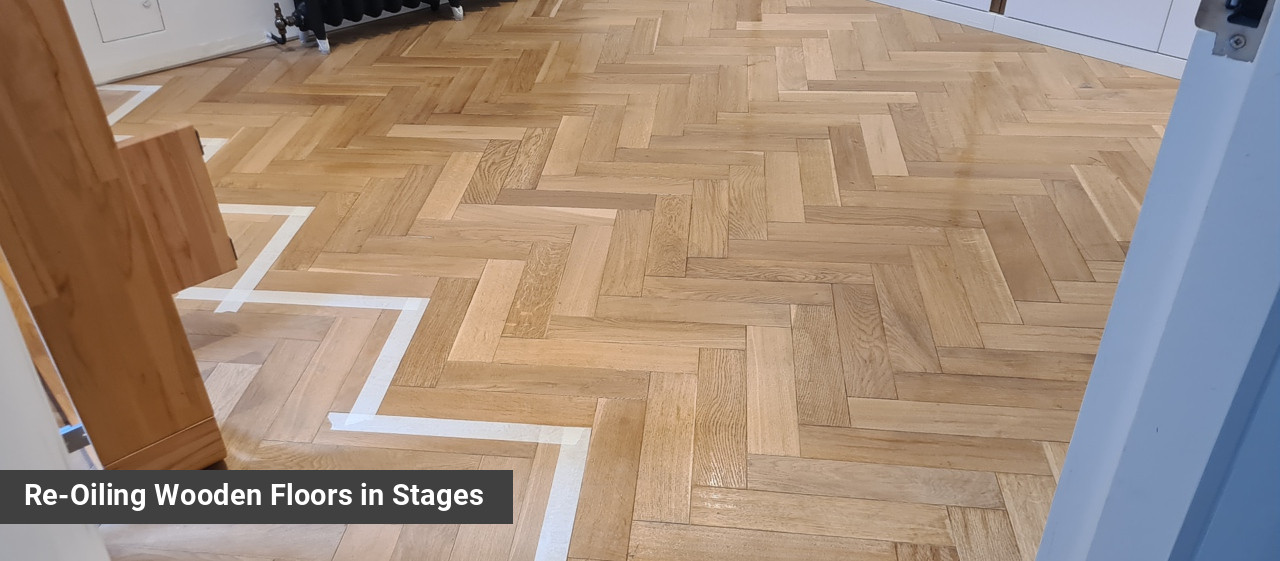Re-oiling wooden floors in the right time is key to the long-term maintenance for oiled wooden floors
Oiled wooden floors are cherished for their rich, natural appearance and soft, matte finish. They offer a timeless, organic warmth that brings out the character of real wood. However, keeping them looking their best isn’t just a matter of cleaning — it requires regular recoating with oil, which is essential for long-term maintenance.
At Floorworks, we often remind customers: just like your skin needs moisturising, your oiled wooden floor needs nourishing too. Here's why, when, and how to re-oil your floors to keep them looking beautiful for years to come and to use the main benefit of the oil-based finishes, namely - to prolong the time before complete floor sanding service, as much as possible.

Why Re-Oiling is Important?
Unlike lacquered floors, which sit on top of the wood with a hard finish, oiled floors absorb the oil into the surface. This enhances the grain and protects the wood from within — but it also means the oil wears off gradually with use.
Without re-oiling, the floor becomes:
Dry and dull in appearance
Vulnerable to moisture, stains, and wear
More likely to develop cracks or surface damage
Regular re-oiling replenishes the protective layer, keeping the wood nourished, hydrated, and better equipped to withstand daily use.
How Wooden Floors Should be Re-Oil?
This depends on the usage level of the room and type of oil used, but here are general guidelines:
| Area Usage | Recommended Re-Oiling Frequency |
|---|---|
| Light-use rooms (bedrooms, guest rooms) | Every 3–5 years |
| Medium-use areas (living rooms, studies) | Every 2–3 years |
| High-traffic areas (hallways, kitchens, entrances) | Every 12–18 months |
| Commercial spaces | Every 6–12 months (more frequently if needed) |
Spot re-oiling can also be done locally in worn patches without redoing the entire floor — a key advantage of oiled finishes.
Tip: If water droplets soak into the wood instead of beading on the surface, it’s a clear sign that your floor needs re-oiling.
The Re-Oiling Process: What to Expect
If your floor is due for maintenance, here’s what a typical re-oiling service looks like:
Clear fruniture, inspect, hoover and clean the floors
The floor is assessed and thoroughly cleaned to remove any dirt, grime, or residues that may interfere with oil absorption.
Light Buffing
A light sanding or screen buffing will be carried out to remove surface marks, smoothen and prepare the old surface of the floors to accept new coat of hardwax-oil. Sometimes, depending on the current build-up of the finish, a second coat may be required. However, the right balance in the amount of oil finish is important, as too thin or thicker coat can both lead to easier marking on the floor.
Application of New Coat(s)
A high-quality hardwax-oil or penetrating oil is applied evenly with rollers or pads. The oil is buffed in, or applied with a short-pile roller into the grain for full coverage. At Floorworks we rely on prooven products like Osmo Polyx Hardwax-Oil for most of our re-waxing works.
The Drying Time
The surface is buffed to remove excess oil and left to dry. Drying time for hardwax-oil can range from 4 to 12 hours depending on product and envrionment conditions.

Benefits of Regular Re-Oiling
Revives the natural beauty and grain of the wood
Enhances water and stain resistance
Extends the lifespan of the floor
Allows easy spot repairs without sanding the whole floor
Maintains a consistent tone and finish over time
Want to find out if your floor is due for a re-oiling?
Get in touch for a no-obligation consultation on site visit or book your next professional re-oiling service today.

Daily Care Tips Between Re-Oiling
Use pH-neutral cleaners made specifically for oiled wood.
Avoid excessive water – damp mop only when needed.
Use doormats and felt pads under furniture to prevent scratching.
Clean up spills promptly to avoid staining.
Final Thoughts from Floorworks
Re-oiling isn’t just a maintenance task — it’s a commitment to preserving the natural charm and durability of your wooden floors. With the right care schedule, your oiled floors can look better with age, offering decades of comfort and style.
At Floorworks, we offer professional re-oiling services tailored to your floor type, room usage, and oil finish. Whether you need a full re-oil, a spot treatment, or a long-term care plan, our expert team is here to help.




